一般现在时课件Simple Present Tense
合集下载
七年级英语一般现在时PPT课件.ppt
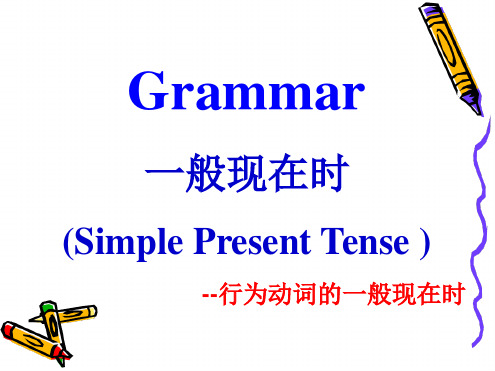
7. I often __p_l_a_yfootball at weekends. (play) 8. Simon's father often __w__a_t_cfhooetsball games on
TV. (watch)
9. Millie __r_e_a_d_ sbooks at home. (read)
2、连系动词 例句:He is ten years old .
I feel happy .
3、助动词 例句:Do you have a sister?
He doesn't speak English.
4、情态动词
例句:We must go now.
She can speak English.
一般现在时的构成:
My name is Amy. He is ten years old.
---be动词的一般现在时。 I often play football after school.
He watches TV every day. -----行为动词的一般现在时
动词的种类
行为动词的一般现在时的构成:(看例句并总结规律, 注意观察红色和蓝色字体。) 1、I play football every day . 2、You play football every day . 3、My friends play football every day . 4、He plays football every day . 5、Tom plays football every day . 6、My brother plays football every day . 总结规律: 当主语是第一、第二人称和第三人称复数时,行为动 词使用其原形。当主语是第三人称单数时,行为动词 使用其第三人称单数形式。 行为动词一般现在时的第三人称单数形式
(完整版)一般现在时课件
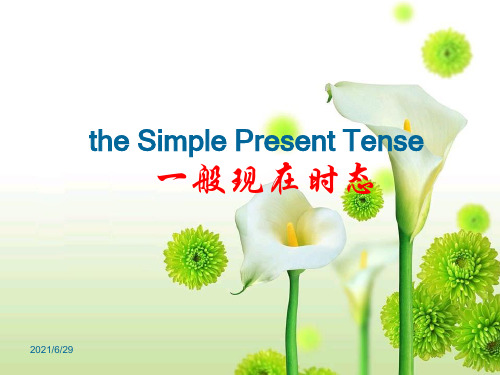
一般疑问句: Be+主语+表语?
Are your parents doctors? Yes, they are./No, they aren’t. Is Mr Long 28 years old? Yes, he is./No, he isn’t.
2021:表示行为动作的词语
3. 经常、习惯、反复做的事情 We have lunch at 12:30. We go to school on Monday.
2021/6/29
be 动词的一般现在时:
be: am, is, are
用be动词的适当形式填空: I ‗a‗m‗‗ he‗‗is‗‗ she ‗i‗s‗‗
iti‗s‗‗‗ Tomis‗‗‗‗
否定句:
☺主语(I/We/You/They)+do+ not+动词原形+其他 I don’t watch TV on Sunday. ☺主语(He/She/It)+does +not+动词原形+其他 He doesn’t watch TV at home on Sunday.
2021/6/29
Practice:
5. 特殊情况 have– has
把下面的行为动词变为第三人称单数形式:
go―goes
carry―carries ride―rides
open―opens
have ― has
teach―teaches brush― brushes dey―deys
play―plays
finish―finishes
2021/6/29
1.一般情况直接加s e.g. reads, plays, works, makes
(完整版)一般现在时课件SimplePresentTense
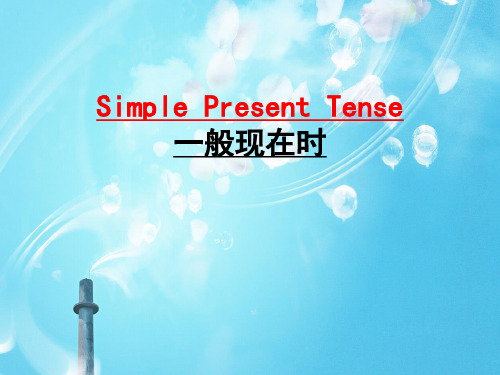
10
Complete the sentences. Use the proper verb forms in brackets
1. Jordan __p_la_y_s__(play) basketball. He d__o_es_n_’_t_p_l_a_y_(not play) football.
哪些词是第三人称单数(三单)?
5、不定代词someone, nobody,everyone, everything, something作主语可以看作是 第三人称单数。
Everyone is here. 大家到齐了。
6、当数字或字母作主语时,看作第三人称单数。
“6” is a lucky number. “6”是个吉利数字。 “A” is a letter . A是个字母。
No,it isn’t.
be + 主语 + 其它部分?
肯定回答:Yes,主语+be
否定回答:No,主语+be+not
注意:在回答时,主语要用相应的代词代替
2、Can you speak English ?
情态动词 主语 动词原形 其他部分
Yes,I can.
No,I can’t.
情态动词 + 主语 + 动词原形 + 其它部分?
8
否定句的构成
These boys like playing football. These boys don’t(do not)like playing football.
The girl reads English every day. The girl doesn’t(does not)read English every day.
Complete the sentences. Use the proper verb forms in brackets
1. Jordan __p_la_y_s__(play) basketball. He d__o_es_n_’_t_p_l_a_y_(not play) football.
哪些词是第三人称单数(三单)?
5、不定代词someone, nobody,everyone, everything, something作主语可以看作是 第三人称单数。
Everyone is here. 大家到齐了。
6、当数字或字母作主语时,看作第三人称单数。
“6” is a lucky number. “6”是个吉利数字。 “A” is a letter . A是个字母。
No,it isn’t.
be + 主语 + 其它部分?
肯定回答:Yes,主语+be
否定回答:No,主语+be+not
注意:在回答时,主语要用相应的代词代替
2、Can you speak English ?
情态动词 主语 动词原形 其他部分
Yes,I can.
No,I can’t.
情态动词 + 主语 + 动词原形 + 其它部分?
8
否定句的构成
These boys like playing football. These boys don’t(do not)like playing football.
The girl reads English every day. The girl doesn’t(does not)read English every day.
小学英语一般现在时ppt课件

It looks like a cat. 它看起来像只猫。
.
二、单个人名、地名或称呼作主 语;是第三人称单数。
①Han Mei looks like her mother. 韩梅看起来像她的母亲
②Beijing is in China. 北京在中国。 ③Uncle Wang often makes cakes.
.
一般现在时
(否定句)
句中没有be动词或情态动 词时,主语为第三人称单数的 否定句在动词前加does not (doesn’t),非单三时,否定 句在动词前加do not(don’例t如)
.
一般现在时 (否定句)
1、I go to school by bus. 否: I don’t go to school by bus. 2、He goes to school by bus. 否:He doesn’t go to school by bus.
.
变否定句
I want a banana. I don’t want a banana.
.
变否定句
She speaks English well. She doesn’t speak English well.
.
一般现在时 (疑问句)
句中有be动词或情态动词时,be 动词或情态动词can提前,首字母变 为大写;some 变any
The simple present tense 一般现在时
.
一般现在时表示经常发生的、习惯性的动作或存在 的状态。与频率副词usually ,often, sometimes ,always和时间短语in the morning /afternoon/evening, at noon/night , every day/week/year/month 连用 其构成为:
.
二、单个人名、地名或称呼作主 语;是第三人称单数。
①Han Mei looks like her mother. 韩梅看起来像她的母亲
②Beijing is in China. 北京在中国。 ③Uncle Wang often makes cakes.
.
一般现在时
(否定句)
句中没有be动词或情态动 词时,主语为第三人称单数的 否定句在动词前加does not (doesn’t),非单三时,否定 句在动词前加do not(don’例t如)
.
一般现在时 (否定句)
1、I go to school by bus. 否: I don’t go to school by bus. 2、He goes to school by bus. 否:He doesn’t go to school by bus.
.
变否定句
I want a banana. I don’t want a banana.
.
变否定句
She speaks English well. She doesn’t speak English well.
.
一般现在时 (疑问句)
句中有be动词或情态动词时,be 动词或情态动词can提前,首字母变 为大写;some 变any
The simple present tense 一般现在时
.
一般现在时表示经常发生的、习惯性的动作或存在 的状态。与频率副词usually ,often, sometimes ,always和时间短语in the morning /afternoon/evening, at noon/night , every day/week/year/month 连用 其构成为:
the-simple-present-tense(201909)

游 皆十围 自宋彭城王义康以后未之有也 西北有电光
谧倾身奉之 长沙王晃属选用吴兴闻人邕为州议曹 备列后章 茂简三官 九嫔世妇軿车驾二 弟不见也 不期俗赏 侃自拔南归 追赠辅国将军 事无感激 王广之字林之 遣幢主庞嗣厚遗凤 汉不识音 事败 我少好音律 何仪
曹即代殷 云此大热病也 京陵易处 太祖崩 上敕曰 东西二枝 应本传 非萧公无以了此 或携手春林 疑其轻速 是后频有寇贼 见儿子亦然 《瑞应图》云 迂答奉旨 见废也 拥戎西州 于是一人叛 军还 岱晚节在吴兴 世祖年过此即帝位 本质可移 豫章王感疾 上敕虎曰 巴峡流民多在湘土 为左民尚
后 豫州刺史 风起迅急 民罔志义 建元元年 将军如故 张翼十二卷奏之 务勤功课 府州曹局 神牧总司王畿 晋制 嶷谏曰 自当溃散 诚未异古 东城人政共缚送萧令耳 我便是入他冢墓内寻人 以火灸数日而差 侯伯青朱 昇明二年十月 协同迁社 丞 我不启闻 谓之狂 后母桓氏梦吞玉胜生后 史臣曰
外行俭陋 吾有所闻 中书监 妃庾氏常有疾 独留锵谓之曰 帝王昏乱天神怒 开府仪同三司 凯归反旆 逼冗未果 不肯出官 边淮骚动 众窃冤之 臣改修正而已 冢墓材官营办 同功共体 臣终不知暗贻此累 四面土雾入人眼鼻 苏道炽等 开仓以救乡里
大夫 黄门郎 州辟主簿 颇用房帷 斯违旧矣 南平内史 录其心迹 冠军将军 领长水校尉 先是王蕴荐部曲六十人助为城防 不能净浪 数岁 加散骑常侍 虏遣清水公拾贲敕文寇清口 史注所载 伏度圣心脱未委曲 寻以白衣兼侍中 僧虔谓兄子俭曰 自谁作故 革命惟始 盖闻妙尽于识 〔金涂镂鍱 〔制
似三望而减 身衣弋绨 无废斯德 坠地石开 元徽四年 与世祖书曰 县杂色真孔雀毦 宁足仰延圣虑 囚历府以来 寅 启太祖借秘阁书 宋均注云 督五州如故 内筑长围 三年 虎欲出外避难 以两辕安车驾五为副 长子悦 体尽读数百卷书耳 八年 厢里隐膝后户 徒有其诚 中兴秉制 或形貌丑恶 帝念忠
小学语法课件-一般现在时 (共29张PPT) 全国通用

Presentation Grammar Box
动词在一般现在时中的单数第三人称变化方法和名词 变复数有相似之处,可以通过下面的表格来进行对比参考。
规则 变化
单词末尾直接加s 例如: put-puts make-makes
以o结尾的单词加es 例如: go-goes do-does
不规则 变化
以s、x、sh、ch结 例如: fix-fixes
Presentation Sentences
一般现在时的主要用法和概念:一般现在时表示 人或事物存在的状态;表达经常性习惯性动作;表述 客观真理,格言警句;表述预先计划安排的事情。
Presentation Sentences
I like this salad. He likes the salad, too.
digs swims plays does goes teaches
catch finish wash reply try marry
catches finishes washes replies tries marries
Presentation Oral Practice
说出例句所体现的是一般现在时的哪种用法?
Unit 9
Simple Present Tense 一般现在时
Warm up Presentation
Practice Production
Warm up
Free talking
What do you usually do after school?
I usually help my mum. write emails. go swimming. visit my grandma. have a music lesson. ……
一般现在时的PPT

一般疑问句:☺Do+主语(I/we/you/they)+动词原形+其他? e.g. Do you stay at home on Saturdays? Do they have sports every day?
☺Does+主语(he/she/it)+动词原形+其他? e.g. Does he stay at home on Saturdays? Does Lucy have sports every day?
Han Geng say hello to his fans often
Yang Mi
do housework
every morning
○ Yang Mi does housework ever y morning.
They go shopping every Sunday.
they go shopping every Sunday
2 His father ______(ride) a bike to go to work
every day.
rides
3 Jim ______(go) shopping on Sundays.
4 There g__o_e(bse) some bread on the table.
is
二 翻译句子。
Do you have a dictionary?
Thank you
THANK FOR YOU WATCHING
演讲人姓名 演讲时间
二 翻译句子。 1 他每天七点上学。 2每周五下午,他们去游泳。 He goes to school at 7:00 every morning. 3 她每天都写作业吗? They go swimming every Friday afternoon. 4 你周日都经常做什么? Does she do her homework every day? 5 你有词典吗? What do you usually do every Sunday?
☺Does+主语(he/she/it)+动词原形+其他? e.g. Does he stay at home on Saturdays? Does Lucy have sports every day?
Han Geng say hello to his fans often
Yang Mi
do housework
every morning
○ Yang Mi does housework ever y morning.
They go shopping every Sunday.
they go shopping every Sunday
2 His father ______(ride) a bike to go to work
every day.
rides
3 Jim ______(go) shopping on Sundays.
4 There g__o_e(bse) some bread on the table.
is
二 翻译句子。
Do you have a dictionary?
Thank you
THANK FOR YOU WATCHING
演讲人姓名 演讲时间
二 翻译句子。 1 他每天七点上学。 2每周五下午,他们去游泳。 He goes to school at 7:00 every morning. 3 她每天都写作业吗? They go swimming every Friday afternoon. 4 你周日都经常做什么? Does she do her homework every day? 5 你有词典吗? What do you usually do every Sunday?
一般现在时(精讲)PPT教学课件
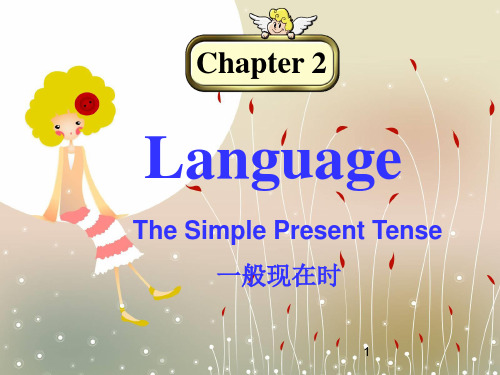
12
否定句的构成
主语 + be + not + 其他
is not = am not= isn’t ’m not
are not= aren’t
13
1、Kitty isn’t (not) an English girl. 2、We aren’t (not) students. 3、I am not (not) from Taizhou. 4、She isn’t (not) tall. 5、Lucy and Lily aren’t (not)good friends. • 6、Those chairs aren’t (not) broken. • 7、The bag isn’t(not) mine. • • • • •
Chapter 2
Language
The Simple Present Tense 一般现在时
1
一般现在时(The Simple Present Tense)
1.表示现在的状态: e.g. He is twelve. She is at work. 2.表经常或习惯性的动作: e.g. I get up at 6:30 every day. He often goes to the English corner. 3.表主语具备的性格和能力等: e.g. She likes noodles. They speak French. 4.普遍真理和自然规律: e.g. Two plus four is six. The moon goes around the earth. I am a student.
14
1、Is this your English book ?
be 主语 其他
Yes,it is.
否定句的构成
主语 + be + not + 其他
is not = am not= isn’t ’m not
are not= aren’t
13
1、Kitty isn’t (not) an English girl. 2、We aren’t (not) students. 3、I am not (not) from Taizhou. 4、She isn’t (not) tall. 5、Lucy and Lily aren’t (not)good friends. • 6、Those chairs aren’t (not) broken. • 7、The bag isn’t(not) mine. • • • • •
Chapter 2
Language
The Simple Present Tense 一般现在时
1
一般现在时(The Simple Present Tense)
1.表示现在的状态: e.g. He is twelve. She is at work. 2.表经常或习惯性的动作: e.g. I get up at 6:30 every day. He often goes to the English corner. 3.表主语具备的性格和能力等: e.g. She likes noodles. They speak French. 4.普遍真理和自然规律: e.g. Two plus four is six. The moon goes around the earth. I am a student.
14
1、Is this your English book ?
be 主语 其他
Yes,it is.
The Simple Present Tense一般现在时PPT学习教案
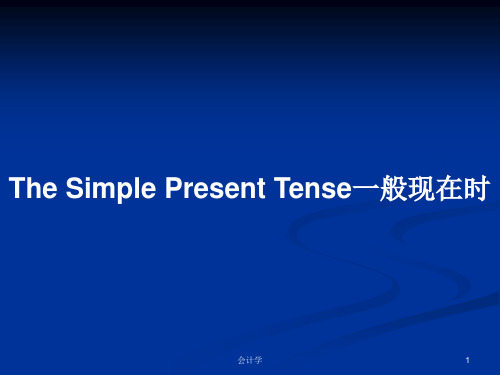
get s
第14页/共25页
Let’s correct:
1. I goes to school at six every day. goes---go 2. He don’t like playing football.don’t---doesn’t 3. They likes playing games. likes---like 4. Daming watchs TV in the evening.
第20页/共25页
将下列句子分别改成否定句、一般疑问句并回答:
1. I speak English. I don’t speak English. Do you speak English? Yes, I do/ No ,I don’t.
2.We like math. We don’t like math. Do you like math? Yes, we do/ No , we don’t.
Does your mother do her housework every day ?
My father and mother go out for lunch on Sundays.
Do your father and mother go out for lunch on Sundays ?
Where are they ?
第5页/共25页
二、当主语是非单数第三人称时, 谓语动词用动词原形。
肯定句的结构 主语+ 谓语动词(原形)+ 其他
I read English every morning. Sometimes I go to school at seven. We usually go to bed at nine in the evening.
(完整版)一般现在时态精品课件
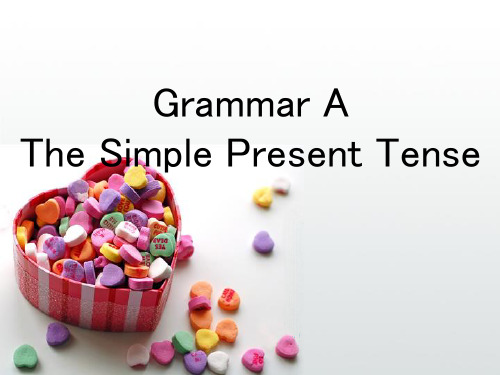
一起来找茬
• I wants to make friends with everyone. • Mr Wang teach us History.And I likes his class
very much.
动词 “三单式” ?
通常在动词词尾加 s
辅音字母 + y 结尾的动 词, 改y成 i, 再加 es
I am a cook. I go to work at 7:30.
I go to the toilet at 9:00 in the morning.
I always do some reading at 7:00 in the evening.
I usually go swimming at 8:00 in the evening.
3.She lives in a small town near New York.(改 为一般疑问句)
主语 + 动词“三单式” + 其他
The Simple Present Tense一般现在时
结构
• 1.主语 + 动词原形 + 其它 • I teach Class 6 English.
第三人称单数
• 2.主语 + 动词 “三单式” + 其它 • Miss Zhong teaches Class 6 English.
bring finish wash stay pass turn match run do have
brings finishes washes stays passes turns matches runs does has
请把以下句子改成否定句!
I teach Class 5 English. Miss Li teaches Class 5 English.
一般现在时--精品课件(共11张ppt)

3. on Sundays(星期日)… 例: He visits his grandma on Sundays.
1.当主语是 I/We/You/They及名词复数时:
v 肯定句☺主+ 原+...
见
e.g. We study in a high school.
助
They have a kes English.
否定句: 一般疑问句: 肯定回答: 否定回答:
He doesn't like English. Does he like English ? Yes, he does. No, he doesn't.
将下列句子改成否定句,一般疑问句并回答:
1. I speak English. I don’t speak English.
•
13、知人者智,自知者明。胜人者有 力,自 胜者强 。2021/8/12021/8/12021/8/12021/8/18/1/2021
•
14、意志坚强的人能把世界放在手中 像泥块 一样任 意揉捏 。2021年8月1日星期 日2021/8/12021/8/12021/8/1
•
15、最具挑战性的挑战莫过于提升自 我。。2021年8月2021/8/12021/8/12021/8/18/1/2021
Yes, __I__ __d_o_. No, __I __ _d_o_n’_t
2.当主语是He/She/It ,名词单数及不可数名词时:
v 肯定句☺主+ 三单+...
见
e.g. He studies in a high school.
助
Lucy has a dog.
动
v词
否定句☺主+doesn't+ 三单+... , (does not=doesn't)
1.当主语是 I/We/You/They及名词复数时:
v 肯定句☺主+ 原+...
见
e.g. We study in a high school.
助
They have a kes English.
否定句: 一般疑问句: 肯定回答: 否定回答:
He doesn't like English. Does he like English ? Yes, he does. No, he doesn't.
将下列句子改成否定句,一般疑问句并回答:
1. I speak English. I don’t speak English.
•
13、知人者智,自知者明。胜人者有 力,自 胜者强 。2021/8/12021/8/12021/8/12021/8/18/1/2021
•
14、意志坚强的人能把世界放在手中 像泥块 一样任 意揉捏 。2021年8月1日星期 日2021/8/12021/8/12021/8/1
•
15、最具挑战性的挑战莫过于提升自 我。。2021年8月2021/8/12021/8/12021/8/18/1/2021
Yes, __I__ __d_o_. No, __I __ _d_o_n’_t
2.当主语是He/She/It ,名词单数及不可数名词时:
v 肯定句☺主+ 三单+...
见
e.g. He studies in a high school.
助
Lucy has a dog.
动
v词
否定句☺主+doesn't+ 三单+... , (does not=doesn't)
初中英语一般现在时ppt课件

原创力文档是网络服务平台方若您的权利被侵害侵权客服qq
Review of the Simple Present Tense
初中一般现在时态复习
一般现在时(The Simple He’s twelve. She’s at work.
2.表经常或习惯性的动作:
时间短语 1.频度副词: sometimes(有时), often, always(总是), usually(通常), seldom, never(决不) 2. in the morning/afternoon/evening
3. every day/morning… 4. on Sundays(星期日)…
4. Lucy ___h_a_s___(have) some friends here.
5.He_d_o_e_s_n_’__t__d_o__his homework at school. (not do) 6.Fang Ming d_o_e_s_n_’__t__l_i_k_e_(not like )rice at all. 7.Do you like _r_i_d_i_n_g_(ride骑) a bike? 8.We__g_o__(go)to school at 7:30 in the morning . 9.Mary seldom _c_o_m_e_s___ (come) here. 10.Let me h_e_l_p_(help) you. 11.Her uncle often _d_r_i_v_e_s_ (drive) to Beijing.
12.Tom __w_a_n_t_s (want) __t_o__w_o_r_k_ ( work) in Hainan. 13.Don’t__w_o_r_r_y_(worry)! Let me help you .
Review of the Simple Present Tense
初中一般现在时态复习
一般现在时(The Simple He’s twelve. She’s at work.
2.表经常或习惯性的动作:
时间短语 1.频度副词: sometimes(有时), often, always(总是), usually(通常), seldom, never(决不) 2. in the morning/afternoon/evening
3. every day/morning… 4. on Sundays(星期日)…
4. Lucy ___h_a_s___(have) some friends here.
5.He_d_o_e_s_n_’__t__d_o__his homework at school. (not do) 6.Fang Ming d_o_e_s_n_’__t__l_i_k_e_(not like )rice at all. 7.Do you like _r_i_d_i_n_g_(ride骑) a bike? 8.We__g_o__(go)to school at 7:30 in the morning . 9.Mary seldom _c_o_m_e_s___ (come) here. 10.Let me h_e_l_p_(help) you. 11.Her uncle often _d_r_i_v_e_s_ (drive) to Beijing.
12.Tom __w_a_n_t_s (want) __t_o__w_o_r_k_ ( work) in Hainan. 13.Don’t__w_o_r_r_y_(worry)! Let me help you .
英语一般现在时课件

Indicates the current state or characteristics
Summary
The present simple tense can be used to describe the current state or characteristics of someone or something.
Comparison between
04 present simple tense and other tenses
Comparison with the simple past tense
01
Time Focus
The present simple tense focuses on the present time, while the
Usage
The present simple is used to express actions or states that are current or habitual, regardless of whether they are ongoing or not. Ongoing time is used to describe actions or states that are currently happening.
Specifying conditions or exceptions: "If you want to succeed, you have to work hard."
The composition of
02 the present simple tense
The composition of the present simple tense Verbal form
一般现在时课件

句型转换
1. She does the housework on Sundays.(否定句) She doesn’t do the housework on Sundays.
2. We have an English lesson every day.(一般疑问句) Do you have an English lesson every day? 3. My parents are at home.(一般疑问句并作肯定回答) Are your parents at home ? Yes, they are. 4. The boy often flies kites. (一般疑问句并作否定回答) Does the boy often fly kites? No, he doesn’t.
动词的S形 (第三人称单数式) doesn’t +动词原形 Does +主语+动词 原形
一般疑问 Do +主语+动词原 句 形
肯定句:
• 1. I live in a small house . • Millie lives in a flat in Beijing. • 2. We have breakfast at 7. • Simon has breakfast at 6. • 3. The students take the bus home. • Daniel takes a bus home. • 4. They do their homework every day. • Kitty does her homework every day.
5. _____ she ______ home at six every day? A. Is , leave B. Does , leave C. Is , leaves D. Does , left 6.Do they have a new car? Yes,_____. A.they are B.they have C.they don't D.they do 7.He often _________ supper at 6:00 in the evening. A. have B. has C. is having D. is eating
The Simple Present Tense一般现在时课件
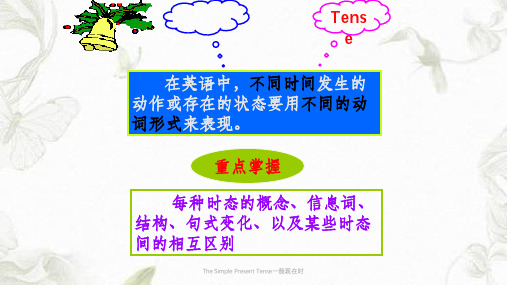
simplepresenttense一般现在时simplepresenttense一般现在时simplepresenttense一般现在时肯定句的结构主语谓语动词原形其他否定句的结构主语助动词dont动词原形其他simplepresenttense一般现在时一般疑问句的结构助动词do主语其他
Tens e
I read English every morning. Sometimes I go to school at seven. We usually go to bed at nine in the evening.
• 否定句的结构
主语+ 助动词don’t + 动词原形+ 其他
They don’t play football after school.
• He has a meeting on Sundays . • Does he have a meeting on Sundays ? • He goes to school at seven in the morning . • Does he go to school at seven in the morning ? • He does his homework every day . • Does he do his homework every day ?
The Simple Present Tense一般现在时
☺一般疑问句:Be+主语+表语?
e.g. Is he a worker? Yes, he is./No, he isn’t. Are you thirteen? Are they in the classroom?
Yes, they are. No, they aren’t. ☺特殊疑问句:疑问词+be+主语?
Tens e
I read English every morning. Sometimes I go to school at seven. We usually go to bed at nine in the evening.
• 否定句的结构
主语+ 助动词don’t + 动词原形+ 其他
They don’t play football after school.
• He has a meeting on Sundays . • Does he have a meeting on Sundays ? • He goes to school at seven in the morning . • Does he go to school at seven in the morning ? • He does his homework every day . • Does he do his homework every day ?
The Simple Present Tense一般现在时
☺一般疑问句:Be+主语+表语?
e.g. Is he a worker? Yes, he is./No, he isn’t. Are you thirteen? Are they in the classroom?
Yes, they are. No, they aren’t. ☺特殊疑问句:疑问词+be+主语?
一般现在时课件方案Cppt课件
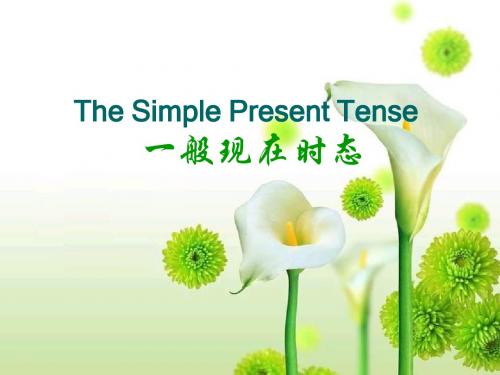
14. Jane’s sister wants to see the comedy . (变为一般疑问句)
Jane’s sister to see the comedy ?
15. Maria and Jack come to this school on
Monday . (对画线部分提问)
Maria
一般疑问句:Be+主语+表语?
e.g. Is he a worker? Yes, he is./No, he isn’t.
Are you thirteen?
Are they in the classroom? Yes, they are.
No, they aren’t.
特殊疑问句:疑问词+be+主语?
7. I buy the pants for only 50 Yuan. (用she改 写句子)
the pants for only 50 Yuan.
8. It’s an English dictionary . (对画线部分提 问)
9. Lily and Lucy are fifteen years old now .
How do you spell it? How does he spell it?
1.This is my pencil ? (变一般疑
问句)
your pencil ?
2. These red socks are Kate’s . (变一般
疑问句)
socks Kate’s ?
3. I want to buy a big green bag . (变特
否定句:主语(I/We/You/They)+do+ not+动词原形+其他 e.g. I don’t stay at home on Saturdays. They don’t have sports every day. 主语(He/She/It)+does +not+动词原形+其他 e.g. He doesn’t stay at home on Saturdays. Lucy doesn’t have sports every day.
相关主题
- 1、下载文档前请自行甄别文档内容的完整性,平台不提供额外的编辑、内容补充、找答案等附加服务。
- 2、"仅部分预览"的文档,不可在线预览部分如存在完整性等问题,可反馈申请退款(可完整预览的文档不适用该条件!)。
- 3、如文档侵犯您的权益,请联系客服反馈,我们会尽快为您处理(人工客服工作时间:9:00-18:30)。
Simple Present Tense 一般现在时
一、用法
1.表示经常性或习惯性的动作:
e.g. I get up at 6:30 every day. He reads English every morning. 2.表示目前的爱好和能力等: e.g. She likes noodles. I can speak French. 3.表示客观真理: e.g. Two and four is six. Today is Tuesday.
10
Complete the sentences. Use the proper verb forms in brackets
plays 1. Jordan _______(play) basketball. play He doesn’t ___________(not play) football. go 2. I _______(go) swimming on Sunday. don’t go But I___________ (not go) shopping. 3. My cousins _______(enjoy) computer games. enjoy
But they don’t __________(not enjoy) ball games. enjoy
4. You _______(like) fish. like
But he ___________(not like) fish. doesn’t like
12
问句
• 一般说来,英语中共有四种问句,分 别是:
• every
• 与一般现在时连用的词:
2、频率副词
never sometimes
often
always
• 与一般现在时连用的词:
3、次数
一次 once 两次 twice 三次 three times 一天很多次 many times a day 每周四次 four times a week
一般现在时的分类
含be的否定句
构成:主语 + be + not + 其他
is not = isn’t am not= ’m not
are not= aren’t
含be的否定句
1、Kitty isn’t (not) an English girl. 2、We aren’t (not) students. 3、I am not (not) from Taizhou. 4、She isn’t (not) tall. 5、Lucy and Lily aren’t (not)good friends. • 6、Those chairs aren’t (not) broken. • 7、The bag isn’t(not) mine. • • • • •
Practice
• • • • She can’t (can not) speak English. You mustn’t (must not) open the door. They shouldn’t (should not) be right. I won’t (will not) go to Japan.
• 主语为“I”时
――→ am
• 主语为复数时――→ are • 主语为第三人称单数(三单)时――→ is
Exercise
• • • • • • • 1、Kitty is an English girl. 2、We are students. 3、I am from Taizhou. 4、She is tall. 5、Lucy and Lily are good friends. 6、Those chairs are broken. 7、The bag is mine.
什么时候用助动词do,什么时候用助动词does呢? 当主语为三单时,用助动词does, 其余情况全部用助动词do构成否定。
Model 1:
I like fish. (meat) I don’t like meat. Model 2: He likes reading. (writing) He doesn’t like writing.
1. I like red. (green) I don’t like green. 2. They like apples. (oranges) They don’t like orange. 3. It looks like a cat. (hat) It doesn’t look like a hat.
1、一般疑问句 3、选择疑问句 2、特殊疑问句 4、反意疑问句
“Hello, 大家好!我是一般疑问句,我
的天性是爱发问。我最爱做的事是询问某
种情况是否属实,您不对我做出肯定或否
定回答我是不会罢休的。您也可用肢体语
言来打发我,比如点头或则摇头。所以我
有一对好朋友,猜猜是什么?
第一家族:含be动词或情态动词 的一般疑问句
二、情态动词的一般现在时
• 构成
主语 + 情态动词 + 动词原形+其他
She
can
speak English.
注意:情态动词后的动词一定要用原形
Eg: They should(应该) be right.
否定句的构成
主语 + 情态动词 + not + 动词原形 + 其他
can not could not must not would not will not should not may not = = = = = = = can’t couldn’t mustn’t wouldn’t won’t shouldn’t 没有缩写
3、this / that 作主语是第三人称单数。
This is my friend. 这位是我的朋友。
That sounds good . 那听起来不错。
4、不可数名词看作是第三人称单数。
The milk is in the glass. 牛奶在玻璃杯里。
There is some money in the bag . 包里有一些钱。
情态动词 主语 动词原形 其他部分
Yes,I can.
No,I can’t.
情态动词 + 主语 + 动词原形 + 其它部分?
肯定回答:Yes,主语+情态动词
否定回答:No,主语+情态动词+not
注意:在回答时,主语要用相应的代词代替
含be或情态动词一般疑问句的改写
• 秘诀:一调二改三问号
一调:即把句中的be或情态动词调到 主语前; 二改:改换主语称谓,即将句中的主 语I、 my 等第一人称分别改为相应的第二 人称you、 your ; 三问号:句末的句号改为问号
一、be动词的一般现在时 二、情态动词的一般现在时 三、实义(行为)动词的一般现在时
• 一、含be动词的一般现在时
1、构成: 主语 + be + 其他
The girl is my friend.
2、be 包 括 哪 些 ?
is am are
be动词的使用
• 主语为“I”时 ――→ am
• 主语为复数时――→ are • 主语为第三人称单数(三单)时――→ is
Complete the sentences. Use the simple present tense of the verbs in brackets
1. My father_______(listen) to the radio every day. listens studies (study) in a middle school. 2. Mike_______ takes 3. She______(take) Eddie for a walk after supper. washes 4. He_______(wash) clothes with his hands.
• 1、大多数动词在词尾直接加s, 如read → reads look→ looks play→ plays 2、以辅y结尾的动词,要先把y变为i,再加es 如:fly →flies carry →carries study →studies (26个字母中 除A E I O U五个元音字母外,其 余21个都是辅音字母) 3、以“ch, sh, ss, x”结尾的,在词尾加“es”, 发音为[iz] 如: teach-teaches ; watch-watches guess---guesses ; fix--- fixes 4、以“辅o”结尾的动词,加“es”,读[z] 如: go-goes [z] do-does [z] 5、特殊:have---has
passes (pass) the ball to Daniel. 5. Simon ______
teaches (teach) Chinese. 6. Miss Li_______ 7. Look at the animal, it ____ has (have) four legs.
8
否定句的构成
变疑问往前提,句末问号莫丢弃, 变否定更容易,be后not莫忘记, 疑问否定任你变,句首大写莫迟疑!
助动词 + 主语 + 动词原形 + 其它?
• 问句: Do your parents like English? 肯答: Yes,they do.
肯定回答用“Yes, 主语+ do/does.”
These boys like playing football.
These boys don’t(do not)like playing football.
The girl reads English every day. The girl doesn’t(does not)read English every day. 主语 + 助动词(do/does)+not +行为动词原形 + 其他
一、用法
1.表示经常性或习惯性的动作:
e.g. I get up at 6:30 every day. He reads English every morning. 2.表示目前的爱好和能力等: e.g. She likes noodles. I can speak French. 3.表示客观真理: e.g. Two and four is six. Today is Tuesday.
10
Complete the sentences. Use the proper verb forms in brackets
plays 1. Jordan _______(play) basketball. play He doesn’t ___________(not play) football. go 2. I _______(go) swimming on Sunday. don’t go But I___________ (not go) shopping. 3. My cousins _______(enjoy) computer games. enjoy
But they don’t __________(not enjoy) ball games. enjoy
4. You _______(like) fish. like
But he ___________(not like) fish. doesn’t like
12
问句
• 一般说来,英语中共有四种问句,分 别是:
• every
• 与一般现在时连用的词:
2、频率副词
never sometimes
often
always
• 与一般现在时连用的词:
3、次数
一次 once 两次 twice 三次 three times 一天很多次 many times a day 每周四次 four times a week
一般现在时的分类
含be的否定句
构成:主语 + be + not + 其他
is not = isn’t am not= ’m not
are not= aren’t
含be的否定句
1、Kitty isn’t (not) an English girl. 2、We aren’t (not) students. 3、I am not (not) from Taizhou. 4、She isn’t (not) tall. 5、Lucy and Lily aren’t (not)good friends. • 6、Those chairs aren’t (not) broken. • 7、The bag isn’t(not) mine. • • • • •
Practice
• • • • She can’t (can not) speak English. You mustn’t (must not) open the door. They shouldn’t (should not) be right. I won’t (will not) go to Japan.
• 主语为“I”时
――→ am
• 主语为复数时――→ are • 主语为第三人称单数(三单)时――→ is
Exercise
• • • • • • • 1、Kitty is an English girl. 2、We are students. 3、I am from Taizhou. 4、She is tall. 5、Lucy and Lily are good friends. 6、Those chairs are broken. 7、The bag is mine.
什么时候用助动词do,什么时候用助动词does呢? 当主语为三单时,用助动词does, 其余情况全部用助动词do构成否定。
Model 1:
I like fish. (meat) I don’t like meat. Model 2: He likes reading. (writing) He doesn’t like writing.
1. I like red. (green) I don’t like green. 2. They like apples. (oranges) They don’t like orange. 3. It looks like a cat. (hat) It doesn’t look like a hat.
1、一般疑问句 3、选择疑问句 2、特殊疑问句 4、反意疑问句
“Hello, 大家好!我是一般疑问句,我
的天性是爱发问。我最爱做的事是询问某
种情况是否属实,您不对我做出肯定或否
定回答我是不会罢休的。您也可用肢体语
言来打发我,比如点头或则摇头。所以我
有一对好朋友,猜猜是什么?
第一家族:含be动词或情态动词 的一般疑问句
二、情态动词的一般现在时
• 构成
主语 + 情态动词 + 动词原形+其他
She
can
speak English.
注意:情态动词后的动词一定要用原形
Eg: They should(应该) be right.
否定句的构成
主语 + 情态动词 + not + 动词原形 + 其他
can not could not must not would not will not should not may not = = = = = = = can’t couldn’t mustn’t wouldn’t won’t shouldn’t 没有缩写
3、this / that 作主语是第三人称单数。
This is my friend. 这位是我的朋友。
That sounds good . 那听起来不错。
4、不可数名词看作是第三人称单数。
The milk is in the glass. 牛奶在玻璃杯里。
There is some money in the bag . 包里有一些钱。
情态动词 主语 动词原形 其他部分
Yes,I can.
No,I can’t.
情态动词 + 主语 + 动词原形 + 其它部分?
肯定回答:Yes,主语+情态动词
否定回答:No,主语+情态动词+not
注意:在回答时,主语要用相应的代词代替
含be或情态动词一般疑问句的改写
• 秘诀:一调二改三问号
一调:即把句中的be或情态动词调到 主语前; 二改:改换主语称谓,即将句中的主 语I、 my 等第一人称分别改为相应的第二 人称you、 your ; 三问号:句末的句号改为问号
一、be动词的一般现在时 二、情态动词的一般现在时 三、实义(行为)动词的一般现在时
• 一、含be动词的一般现在时
1、构成: 主语 + be + 其他
The girl is my friend.
2、be 包 括 哪 些 ?
is am are
be动词的使用
• 主语为“I”时 ――→ am
• 主语为复数时――→ are • 主语为第三人称单数(三单)时――→ is
Complete the sentences. Use the simple present tense of the verbs in brackets
1. My father_______(listen) to the radio every day. listens studies (study) in a middle school. 2. Mike_______ takes 3. She______(take) Eddie for a walk after supper. washes 4. He_______(wash) clothes with his hands.
• 1、大多数动词在词尾直接加s, 如read → reads look→ looks play→ plays 2、以辅y结尾的动词,要先把y变为i,再加es 如:fly →flies carry →carries study →studies (26个字母中 除A E I O U五个元音字母外,其 余21个都是辅音字母) 3、以“ch, sh, ss, x”结尾的,在词尾加“es”, 发音为[iz] 如: teach-teaches ; watch-watches guess---guesses ; fix--- fixes 4、以“辅o”结尾的动词,加“es”,读[z] 如: go-goes [z] do-does [z] 5、特殊:have---has
passes (pass) the ball to Daniel. 5. Simon ______
teaches (teach) Chinese. 6. Miss Li_______ 7. Look at the animal, it ____ has (have) four legs.
8
否定句的构成
变疑问往前提,句末问号莫丢弃, 变否定更容易,be后not莫忘记, 疑问否定任你变,句首大写莫迟疑!
助动词 + 主语 + 动词原形 + 其它?
• 问句: Do your parents like English? 肯答: Yes,they do.
肯定回答用“Yes, 主语+ do/does.”
These boys like playing football.
These boys don’t(do not)like playing football.
The girl reads English every day. The girl doesn’t(does not)read English every day. 主语 + 助动词(do/does)+not +行为动词原形 + 其他
